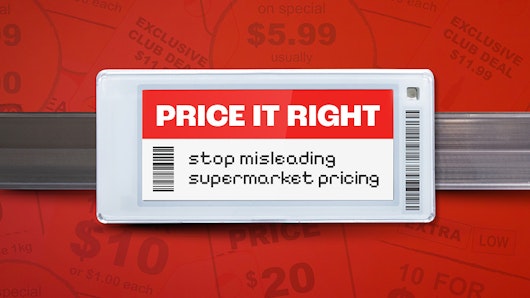Consumer NZ calls for stronger action in New Zealand following the ACCC supermarket report, particularly on pricing and promotional practices.

The Australian Competition and Consumer Commission’s (ACCC's) inquiry into the Australian supermarket sector has led to 20 key recommendations aimed at improving competition, pricing transparency and fairness in the supermarket sector. Consumer NZ urges the New Zealand government and regulators to take note.
“We continue to see significant issues in New Zealand’s supermarket sector. With fewer players in the market, our situation is, in many ways, worse than Australia’s, meaning we need a stronger response to address the issues shoppers face,” says Consumer NZ chief executive Jon Duffy.
“It's been more than three years since the Commerce Commission's market study into the grocery sector in New Zealand, and while we've seen some action, including the appointment of a Grocery Commissioner and the introduction of a grocery code of conduct, as yet, there's been no meaningful improvements for shoppers.”
“The Commission told supermarkets they should sort their pricing and promotional practices, but this feels more like a feather than a stick – with New Zealanders losing tens of millions of dollars to pricing errors annually. Recommendations alone haven’t been effective, and, while the Commission is prosecuting some supermarkets and investigating others, given the low level of fines the courts can impose, further regulation might be the only way forward.”
Consumer's Sentiment Tracker survey has revealed that the cost of food and groceries remains a top financial concern for New Zealanders.
“The ACCC report points to the need for rigorous reforms, many of which would also benefit New Zealand consumers if they were adopted here.”
Key recommendations from the ACCC report
Clearer pricing through regulation of promotional practices including publishing the discounted price, the previous price and unit prices of both
Notification when shrinkflation occurs on shelves and product webpages
Transparency regarding supply forecasts, weekly tendering processes and wholesale fresh produce prices between supermarkets and suppliers to promote more favourable terms for suppliers
A review of loyalty programmes’ value in 3 years to ensure consumer benefits
Australian state governments adopting measures to address planning and zoning issues to target resource management issues over land banking.
New Zealand’s Commerce Commission recommendations
Grocery retailers should ensure their pricing and promotional practices are simple and easy to understand.
Grocery retailers should cooperate with price comparison services.
Develop a mandatory grocery code of conduct to govern relationships between grocery retailers and suppliers. (The Commission has since said this code isn’t working as intended.)
Improve the availability of sites for retail grocery stores under planning laws, with parliament introducing the Commerce (Grocery Sector Covenants) Amendment Act, which prohibits anti-competitive land covenants.
The Commission has not recommended a review of loyalty programmes. Instead, it recommended that supermarkets ensure disclosure relating to loyalty programmes, data collection and use practices is clear and transparent.
Consumer’s own research into supermarket loyalty schemes has shown that 84% of New Zealanders use loyalty cards, but ‘specials’ and discounts don’t always reflect the lowest prices available at the check-out.
The ACCC report states it took the German multinational discount supermarket chain Aldi more than 20 years to gain its current Australian market share of 9%.
“We are at a crucial point where more must be done to tackle the structural and systemic issues in our supermarket sector. Consumers are facing persistently high prices, and the ACCC report shows that, without additional regulation, a third entrant in the grocery sector is not the silver bullet it is often presented as,” Duffy says.
Consumer urges stronger regulation and enforcement to address ongoing concerns around supermarket pricing and market power in New Zealand.

Make supermarkets price it right
Find out about our campaign to tell the government we need clear rules, stronger penalties and automatic compensation for shoppers.
Comments
Was this page helpful?
Related articles

Suppliers say supermarket duopoly using power to squeeze margins

Supermarkets' super profits - where’s the fair pricing for Kiwis?

Consumer NZ thanks the public for sharing dodgy supermarket pricing examples, leading to criminal charges
